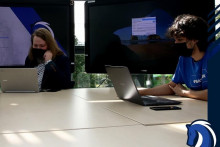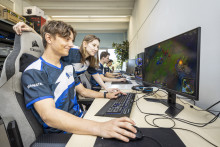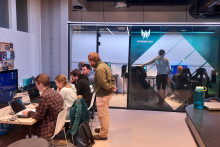How is the competition set up?
Gellaerts: ‘We’re a team of nine people, with three coaches and six players. We had a group stage with eight teams in total from multiple universities in the Netherlands, which you have to compete against twice. All matches had to happen online, but most of the banter of course happens in real life. Tournaments are a lot of psychological warfare as well.’
What moments stood out during the tournament?
Tempelaar (a student of University College ATLAS): ‘During the playoffs we got more comfortable with one another and knew our strengths and weaknesses, while still having fun and experimenting with new strategies. After winning our second game, everyone started dancing around, which not only increased our confidence but most of all confused our opponents.’
How do you prepare for these kinds of clashes?
Gellaerts: ‘We had to establish practice matches against good opponents, rewatching past games to look for mistakes and talking those through with our players. But of course it’s difficult to combine student life and exams with these competitions.’
Do you have rivalries within your competitions?
Gellaerts: ‘We always have our local rivalry with Blueshell Esports, the other UT contender. But our final opponent, the Erasmus Esports team from Rotterdam, is always a fun competition as well.’
What was your recipe for success?
Gellaerts: ‘You always need to make sure that the game is fun. If the players don’t have fun, they won’t perform as well as they could. We were also the only team with three coaches on board.’
Tempelaar: ‘Us players are the main ingredient of course.’
What are your future goals after this success?
Tempelaar: ‘Now that we qualified for the University Esports Masters Open Series starting in July, it would be amazing to land somewhere in the top 3. The tournament is usually dominated by German and Spanish teams, so it would be great to put a Dutch team on the map. But first, we will have a socially-distant barbecue to celebrate this victory.’







